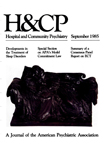APA's Model Law: A Commitment Code by and for Psychiatrists
Abstract
The author argues that the APA model law is seriously flawed because it lacks sufficient mechanisms for questioning the judgment ment of psycbiatrists throughout the commitment process and for ensuring the best disposition of patients. By failing to provide f or independent screening of commitment petitions, to mandate multiple psychiatric evaluations of respondents, to provide mdigent respondents a free psychiatric examination to help them prepare for the commitment hearing, and to address the shortcomings of legal advocacy, the model law sets the stagefor improper or unwarranted commitments. In addition, the law circumvents the rights of patients admitted on emergency status to refuse treatment throughout the entire evaluation period, which can last up to 14 days.
Access content
To read the fulltext, please use one of the options below to sign in or purchase access.- Personal login
- Institutional Login
- Sign in via OpenAthens
- Register for access
-
Please login/register if you wish to pair your device and check access availability.
Not a subscriber?
PsychiatryOnline subscription options offer access to the DSM-5 library, books, journals, CME, and patient resources. This all-in-one virtual library provides psychiatrists and mental health professionals with key resources for diagnosis, treatment, research, and professional development.
Need more help? PsychiatryOnline Customer Service may be reached by emailing [email protected] or by calling 800-368-5777 (in the U.S.) or 703-907-7322 (outside the U.S.).



